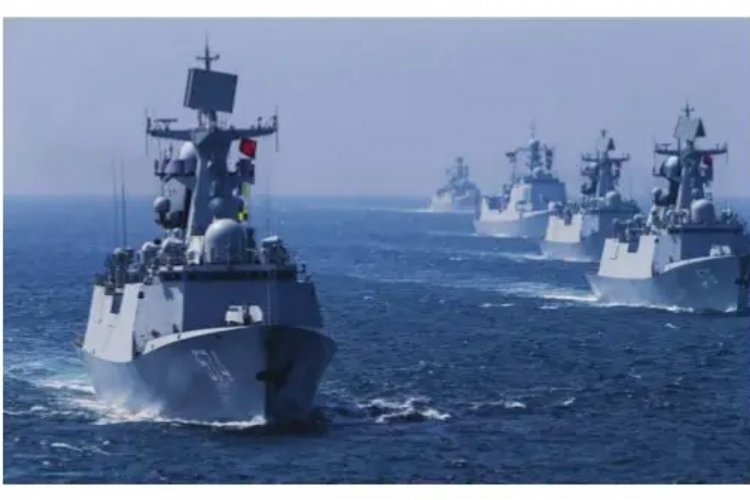India - China: China’s Aggressive Strategies to Expand Strategic Influence in the Indian Ocean
STORIES, ANALYSES, EXPERT VIEWS

China has pursued aggressive strategies to expand politico-diplomatic, economic and strategic influence among the Indian Ocean littorals and the regional seas.
The impact of such an aggressive posture, according to Vijay Sakhuja (Emeritus Professor of Research, SoA Centegr for Integrated Maritime Studies and Research - SOACIMSR, Siksha ‘O’ Anusandhan University, Bhubaneswar, India) “has been maritime infrastructure to support the 21st century Maritime Silk Road under the Belt Road Initiative, naval bases/facilities for access by the Chinese Navy, and arms exports to several smaller countries in the region particularly in South Asia thereby disturbing regional peace and stability. Its distant water fishing fleet is also accused of engaging in Illegal Unreported and Unregulated (IUU) fishing and has attracted concerns from several Indian Ocean countries.”
Global Development Initiative (GDI)
At another level, writes Sakhuja “the Chinese leadership has been pushing the Global Development Initiative (GDI), a development partnership agenda which according to the Chinese resonates with the United Nations-led 2030 Agenda for Sustainable Development (17 Goals).”
The GDI involves close to 200 projects and half of these have been completed. Over 100 countries and international organisations support the GDI, and nearly 70 countries have joined the Group of Friends of the GDI.
China-Indian Ocean Region Development Cooperation Forum
Encouraged by the popularity and support for the GDI, China hosted the first ever ‘China-Indian Ocean Region Development Cooperation Forum’ in November 2022 at Kunming, the capital of Yunnan province in southwest China. A year later, the second iteration of the Forum was held at the same destination. It focused on the ocean economy and was labelled ‘Shared Development: Theory and Practice from the Perspective of the Blue Economy’, similar to the first Forum.
It was attended by 19 Indian Ocean littoral countries including landlocked Afghanistan and three international organisations. It was organised by the China International Development Cooperation Agency (CIDCA). Luo Zhaohui, chairman of CIDCA, who is also China’s current Vice-Foreign Minister, has emphasised that ‘China will strengthen cooperation with countries in the Indian Ocean region to grow the blue economy, advance the implementation of the GDI (Global Development Initiative) in the region, embark on the path to shared development, accelerate cooperation and work together to build a maritime community with a shared future.’
‘Shared future’ among the Indian Ocean countries
China thus, according to Sakhuja “is promoting this idea of ‘shared future’ among the Indian Ocean countries and has drawn plans to set up a Blue Economy think tank network, establish a China-Indian Ocean Region marine disaster prevention and mitigation cooperation mechanism, and is even willing to provide fiscal, technological and training support…..”
There is an important reason which encourage China to push the development agenda. “Beijing believes that ‘China-Indian Ocean Region Development Cooperation Forum’ can dispel fears about China’s strategic ambitions in the region and assure Indian Ocean countries that it is committed to their economic growth.”
Countering India’s Indo Pacific Ocean’s Imitative (IPOI)
Sakhuja emphasises “there is a belief that the Chinese proposal is aimed at countering India’s Indo Pacific Ocean’s Imitative (IPOI) which comprises of seven pillars: (a) Maritime Security; (b) Maritime Ecology; (c) Maritime Resources; (d) Capacity Building and Resource Sharing; (e) Disaster Risk Reduction and Management; (f) Science, Technology and Academic Cooperation; and (g) Trade, Connectivity and Maritime Transport.
“Under the IPOI, India has created a sense of community and several partnerships are mushrooming in the Indo Pacific region. New Delhi is encouraging other countries as well as groupings such as the ASEAN to join the IPOI as also lead some thematic areas under the Initiative in diverse areas spanning security, safety, resource development, science and technology, resilient infrastructure and marine environment-ecology.”
Indian concerns
The Indian political and diplomatic establishment as well as the strategic-academic community has conveyed New Delhi’s concerns of the growing Chinese influence in the Indian Ocean region. The Indian naval leadership, writes Sakhuja “has perhaps been the most vocal about the Chinese naval presence and flagged these at multilateral forums, and regional dialogues.”
















